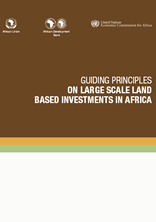Guiding Principles on Large Scale Land Based Investments in Africa

The African Union (AU) views the agricultural sector as a critical component of its agenda for a structural transformation of Africa’s economies. In this regard, the African Union has demonstrated solidarity, leadership and commitment to the sector, developing the Comprehensive Africa Agricultural Development Program (CAADP) implemented by the NEPAD Planning and Coordinating Agency. CAADP recognizes the need to support Africa’s smallholder farmers including women. Smallholder farmers contribute over 70% of agricultural output amid tremendous challenges including, in particular, limited access to productive resources, inputs and markets. Under the context of CAADP, African States committed to increasing their agricultural growth rates per 6% per by simultaneously increasing levels of domestic spending on agriculture while also fostering increased private investment.
In 2006 the Land Policy Initiative (LPI) of the African Union, the Economic Commission for Africa (ECA) and the African development Bank (AfDB) concluded the development of a Framework and Guidelines) on Land Policy in Africa (F&G) to facilitate national land policy development and implementation processes. The F&G highlights and provides direction for addressing key land issues on the continent, including emerging global and strategic issues such as the “new scramble for Africa’s land resources” which is taking place as Member States seek to increase investment in agriculture (also known as large scale, land based investments). It calls for specific examination of whether demands on Africa’s land “…can be met while observing sustainability guidelines and without marginalizing the land rights of African Communities.” The F&G was endorsed by African ministers responsible for agriculture and Land in March 2009, and subsequently by the AU summit of heads of state and government, through the adoption of a Declaration on Land Issues and Challenges in July 2009. The Declaration specifically urges member states to develop land policies that “take into account their peculiar needs” in accordance with the key principles outlined in F&G.
In October 2010, as part of its activities to promote dialogue, awareness and consensus on large scale land based investments (LSLBI) the LPI convened a high level meeting on alongside the AU conference of ministers responsible for agriculture. The meeting and preceding engagement culminated in the adoption of the Nairobi Action Plan whose implementation was to be spearheaded by the LPI.
The Nairobi Action Plan calls for urgent action to: develop land policies that reduce the underlying risks of LSLBI through a variety of approaches, including enhancing the security of land rights, building evidence on LSLBI drawing on best practices, t enhancing capacities and facilitating fair and transparent LSLBI deals. Another important intervention envisaged under the Nairobi Action Plan was the development of guiding principles on LSLBI. The guiding principles would be a tool to promote responsible LSLBI.